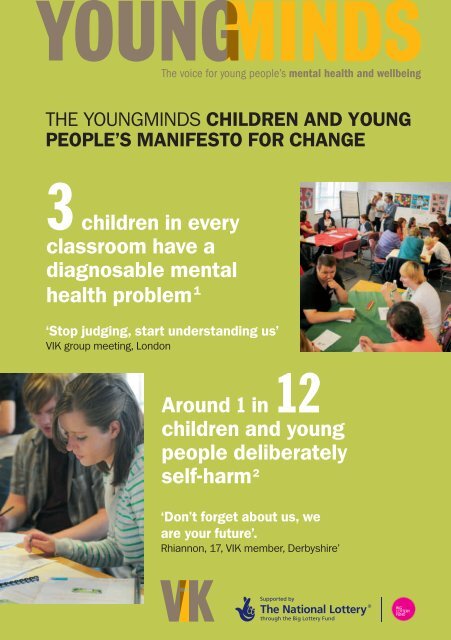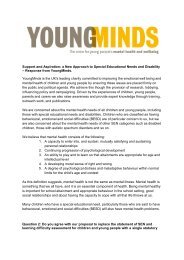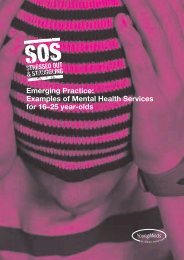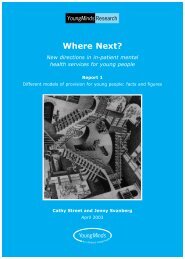The YoungMinds manifesto
The YoungMinds manifesto
The YoungMinds manifesto
You also want an ePaper? Increase the reach of your titles
YUMPU automatically turns print PDFs into web optimized ePapers that Google loves.
THE YOUNGMINDS CHILDREN AND YOUNG<br />
PEOPLE’S MANIFESTO FOR CHANGE<br />
3 children in every<br />
classroom have a<br />
diagnosable mental<br />
health problem 1<br />
‘Stop judging, start understanding us’<br />
VIK group meeting, London<br />
Around 1 in 12<br />
children and young<br />
people deliberately<br />
self-harm 2<br />
‘Don’t forget about us, we<br />
are your future’.<br />
Rhiannon, 17, VIK member, Derbyshire’
Mental health is as important as physical health and needs to<br />
be everyone’s business.<br />
This <strong>manifesto</strong> has been created by <strong>YoungMinds</strong> Very Important<br />
Kids (VIK) Participation Project funded by the National Lottery. We<br />
campaign to improve mental health services both regionally and<br />
nationally, raise awareness about children and young people’s<br />
mental health and wellbeing and work to increase young people’s<br />
participation in service design and delivery.<br />
Our <strong>manifesto</strong> covers 11 areas where we believe things must change<br />
if all young people with mental health problems are to get the support<br />
they need. Treating us like outcasts and only dealing with us when our<br />
problems become a crisis just makes things worse. <strong>The</strong>re have been<br />
hundreds of policy documents that are meant to have made things<br />
better for us, but we are still suffering. We want our Government to<br />
realise the effect mental health problems have on us and millions of<br />
other young people. Spending more money on us while we are young<br />
will stop us ending up in Accident and Emergency, psychiatric units<br />
and prisons, thereby saving taxpayers millions of pounds in the future.<br />
We urge our government to implement this <strong>manifesto</strong> and reduce<br />
the suffering of the thousands of young people in this country with<br />
mental health problems.<br />
Front cover<br />
1 Green, H., McGinnity, A., Meltzer, H., et al. (2005). Mental health of children and young people in<br />
Great Britain 2004. London: Palgrave. See http://www.statistics.gov.uk/<br />
2 Mental Health Foundation (2006). Truth hurts: report of the National Inquiry into self-harm among<br />
young people. London: Mental Health Foundation
THE MANIFESTO<br />
1 Stigma still affects us; it’s about time we were able to talk about<br />
how we feel.<br />
We cannot be open about how we feel because we believe we will be judged.<br />
Society needs to accept that anyone can have mental health problems and that it is<br />
part of life. Our friends, teachers and other adults are scared of our illnesses and that<br />
makes us feel we can’t speak out. We have been called ‘attention seeking’,<br />
‘drama queens’, ‘mental’, ‘weird’, and told to ‘shut up, it’s just hormonal’. We all need<br />
to talk about how we feel inside. We also want the media to be more educated about<br />
mental health problems so they don’t misrepresent us and create fear about us.<br />
2 Dealing with problems when we are young; train primary school staff<br />
Don’t ignore us when we are young - we are your future. Every child matters and<br />
teachers need to notice when we are distressed at primary school. We need help<br />
and support early on - not when it’s too late. (Sarah, 14, from VIK, was abused from a<br />
young age and bullied at school. She was excluded from the classroom for her<br />
‘disruptive’ behaviour, which made her feel unworthy, unwanted and bad when what<br />
she really wanted was for ‘someone to notice my distress and help me’.) We want<br />
more trained workers we can talk to, who will look out for us and our needs and we<br />
want to be taught how to be emotionally healthy and look after ourselves.<br />
Over half of all adults<br />
with mental health<br />
problems were<br />
diagnosed in childhood.<br />
Less than half were<br />
treated appropriately<br />
at the time 3<br />
3 Kim-Cohen, J., Caspi, A., Moffitt, TE., et al (2003): Prior juvenile<br />
diagnoses in adults with mental disorder.
Nearly 80,000children<br />
and young people suffer from<br />
severe depression 4<br />
3 Growing up is difficult; support us when changes happen in our lives<br />
We need more support when we leave primary and go to secondary school. This is a<br />
difficult and frightening time for most of us and if we have emotional and mental health<br />
problems it can make it much worse. Every primary and secondary school should have<br />
a plan in place to support us.<br />
We also need more support for other transitions in our lives, if a parent or someone<br />
we are close to dies and if we are making the transition from a psychiatric unit back to<br />
school. (Jamal, 16, who is a member of Healthy Heads, said he got no support from<br />
local services in the community when he left the unit he was in. He was unable to go<br />
to school as it was unable to provide sufficient support, which meant he got no<br />
education and his mum had to give up her job to look after him.)<br />
4 Getting what we need at secondary school; train everyone to<br />
understand teenagers problems.<br />
Three children in every class have a mental health problem and it is getting worse. We<br />
need everyone who works with young people, including teachers, school nurses and<br />
youth workers, to have better training in emotional wellbeing and mental health and for<br />
young people in schools to be able to get help and support from trained counsellors<br />
and mental health workers. (David, 17, from the VIK panel spent many months being<br />
sent to the SEN room at his school because his teachers’ response was to punish<br />
him rather than get him help.)<br />
4 Office for National Statistics (2004). Census2001: national report for<br />
England and Wales. London: Office for National Statistics.
5 Waiting lists and assessments just make it harder; make them shorter and<br />
provide us with one worker for all our care.<br />
It is so hard for us having to go on waiting lists to see a Child and Adolescent Mental<br />
Health Services (CAMHS) worker. We should not have to wait weeks to see someone,<br />
and if there is a delay we should have some support while we are waiting. (Joe, 18,<br />
from Healthy Heads, had to wait 12 weeks to see the CAMHS team in his local area<br />
and then had to travel across south London where he lived to regular appointments in<br />
an area with a violent reputation, which made him feel even more unsafe and<br />
vulnerable.) Many of us have also been assessed over and over again by<br />
professionals. This is stressful and frustrating for us. We want workers to talk to each<br />
other so we don’t have to keep telling each of them about our painful feelings.<br />
6 Someone to speak up for us; we all need advocates<br />
Sometimes we are so distressed and anxious we can’t say what we need and it would<br />
really help us if we had someone to speak up for us. (Charlie, 23, from Healthy Heads,<br />
told us he has felt so withdrawn from the world he is unable to say anything to the<br />
many counsellors/psychiatrists and mental health workers he has seen, but if he<br />
had a relationship with one professional it would be much easier for him.) Some of us<br />
who have been sectioned have an advocate to speak for us, but they are a small<br />
percentage of the one in 10 of us with mental health problems. We would like more<br />
access to advocates for all of us who need them.<br />
95% of imprisoned<br />
young offenders have a<br />
mental health disorder 5<br />
5 Office for National Statistics (1997): Psychiatric morbidity among young<br />
offenders in England and Wales. London: Office for National Statistics
45% of children in care have<br />
a mental health disorder 6<br />
7 Some doctors don’t listen to us; they need to understand and support us<br />
When we are unhappy our doctors are often the first professional we visit to tell them<br />
about our distress. Sometimes they are dismissive and we don’t feel listened to.<br />
(21 year-old Alison’s doctor told her he couldn’t help her and suggested she call the<br />
Samaritans.) We want all GPs to have better training in mental health and in talking to<br />
young people about their problems.<br />
8 Going to Accident and Emergency can be traumatic; treat us with<br />
respect, see beyond our labels<br />
Many of us have ended up in A and E because we have self-harmed or attempted<br />
suicide. Some nurses and doctors have treated us really badly. (At 14, Mia from VIK<br />
was admitted to A and E after trying to kill herself. She was kept in an open bay and,<br />
in order to keep her awake, was sworn at, shaken and roughly handled with no<br />
explanation as to why she was being treated in this way.) We want hospital staff to<br />
have better training on the issues that often underline our mental health problems,<br />
such as sexual abuse and violence, and an understanding of our needs and how we<br />
feel inside.<br />
9 Some psychiatric units feel like prisons; learn from the best ones<br />
When we have had to spend time in psychiatric units some of us have been to ones<br />
that have been good, but many of us spent time in units that made us feel much<br />
worse. We have not been allowed to use our mobile phones, the internet, listen to our<br />
favourite music on our iPods or have our friends to visit. Often we are unable to go<br />
back to our own schools when we leave, and sometimes we end up going back to the<br />
conditions that made us ill in the first place. We want the units that have not helped us<br />
to learn from the units that have been a good experience for us, so that they improve.
10 Lost in the system; don’t forget about us when we are 16 plus<br />
So many of us get lost at 18 - it’s a watershed. We are supported through CAMHS till<br />
we get to this age and then we are on our own and lose any care we had. (Mel, from<br />
Healthy Heads, was in a unit that provided her with lots of support, but as soon as<br />
she was 18 they couldn’t work with her anymore. She spent days on the phone trying<br />
to get a social worker to help her and was so distressed by the lack of response she<br />
ended up self-harming really badly and was hospitalised.) We want continuing,<br />
high-quality care. If we don’t get this we are likely to get worse and that’s not good<br />
for us or anyone else.<br />
11 We’re the experts; start listening to us<br />
Make sure we are at the heart of planning, commissioning and evaluating<br />
the outcomes of mental health services. Don’t do this as a token gesture, but really<br />
listen to us because we are the ones who really know what it is like.<br />
Who are we?<br />
<strong>YoungMinds</strong> is the UK’s leading charity committed to improving the emotional<br />
wellbeing and mental health of all children and young people aged up to 25 and<br />
empowering their parents and carers. Driven by their experiences, we campaign,<br />
research and influence policy and practice. We also provide expert knowledge<br />
to professionals, parents and young people through our Parents Helpline<br />
(0808 802 5544), online resources, training and development, outreach work<br />
and publications.<br />
To contact us about our <strong>manifesto</strong> and to watch Messin’ With Our Heads, the<br />
powerful and moving short film made by VIK which brings alive the <strong>manifesto</strong> points<br />
go to www.youngminds.org.uk, email campaigns@youngminds.org.uk or call Hannah<br />
Smith on 0207 336 1451<br />
6 Meltzer, H., Gatward, R., Corbin, T., et al. (2003). <strong>The</strong> mental health of young people looked after<br />
by local authorities in England. London: Stationery Office.
Beatbullying<br />
Zurich Community Trust









![Download file [YoungMinds Magazine Issue 115]](https://img.yumpu.com/41743250/1/184x260/download-file-youngminds-magazine-issue-115.jpg?quality=85)



